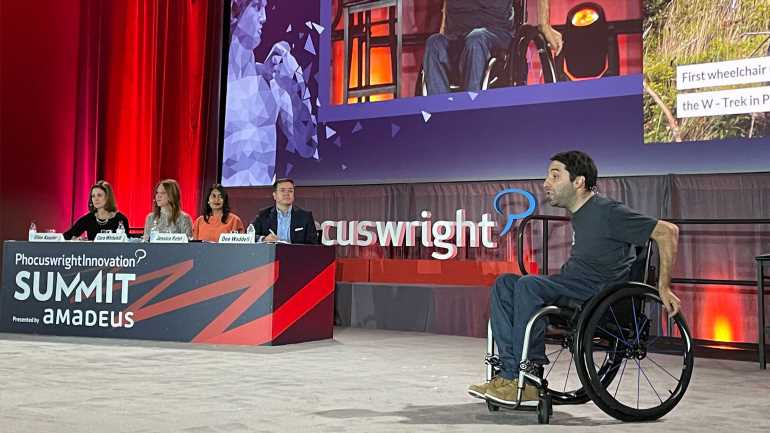Travel tech takes the stage at Phocuswright
After a pandemic-related plunge in funding for travel technology startups in 2020, with investment dropping 56% from the previous year, funding through the third quarter of 2021 has surpassed last year’s levels and has already reached levels last seen as recently as 2017.
With purse strings loosening, a parade of innovators took the stage at the Phocuswright Innovation Summit on the first day of the Phocuswright Conference to pitch investors a wide range of products, from helping hotel managers maximize revenue to helping their bell staff collect tips in an increasingly cashless society.
The presenting entrepreneurs showcased products for travel agencies (corporate and leisure), handicraft vendors, vacation rental hosts and the travelers themselves. A sampling:
Artificial intelligence, meet leisure travel
Revital Kristal, CEO of ReTravel.io, uses machine learning to help travel agencies automatically push options to travelers once the basic outline of a trip has been established by predicting additional elements that the traveler is likely to also purchase, and timing offers to what is likely the best time to present an option.
It is, Kristal said, “contextual” in terms of content and timing. Offers are white labeled with an agency’s name and logo; ReTravel’s revenue comes from commissions and a monthly subscription fee.
Expanding accessible travel
Alvaro Silberstein, CEO and co-founder of Wheel the World, hopes to empower people with disabilities explore the world while simultaneously providing access for travel suppliers to a $23 billion market.
Information for travelers with disabilities is hard to find, Silberstein said, and traveler needs differ significantly among individuals. By putting detailed accessibility data in the cloud, his app will help travelers discover the accessibility profile of different travel products and book products that match their needs and desires. There are currently 500 listings in Wheel the World, with information provided by suppliers and supplemented by crowdsourcing.
Incentivizing corporate travelers
Tripkicks is an add-on to existing corporate booking tools that CEO Jeff Berk says can help companies influence their employees’ travel behavior by providing incentives to align with both corporate and personal goals. Rather than trying to mandate employee compliance, for instance, Tripkicks matches motivations to individual employees. If, for example, it’s known that a traveler is particularly focused on sustainability, the reward may be that their trip is balanced by carbon offsets.
Or, if their interests lie elsewhere, they could receive an Amazon gift card.
Either way, it’s designed to ultimately save money for companies.
Video sales of handicrafts
Lola Akinmade Akerstrom, co-founder and CEO of Local Purse, saw convergence among several pandemic-related phenomena: video conferencing, the rise in online sales and the local merchants around the world who had previously marketed to tourists but whose businesses had been devastated by border restrictions.
Local Purse connects merchants to buyers around the world via video presentations. (Video presentations are four times more likely to result in a transaction than passive webpages, Akerstrom said.)
Local purse takes a 20% commission and, if it also fulfills the order, another 5%.
Monitoring guest noise levels
NoiseAware was a rare pitch that includes a physical product. The company’s noise detection device can be put into rooms in vacation rentals and — without recording or streaming the sound — alerts a property manager if volume exceeds a certain level (taking the time of day into account).
Its CEO, Andrew Schulz, has his sights set on expanding into hotels, as well.
Tipping in a cashless society
Many hotel employee who depend on tips are struggling both from a year of reduced travel and the trend toward a cashless society — increasingly, guests are not carrying much, if any, cash.
These trends are reducing service personnel income, creating awkward guest experiences and recruitment headaches for properties trying to fill service positions that rely on tips.
Enter Youtip, an app travelers can use with a QR code or link to tip with credit cards or phone-enabled payment systems, with the funds redistributed to the employee by the property.
Going forward, the company is developing ways to route the money toward a debit card, health savings account or investment account.
Source: Read Full Article



